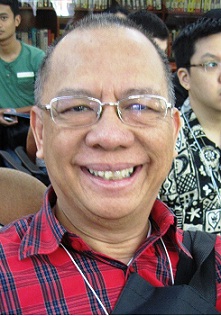Text and photos by ELIZABETH LOLARGA/strong>
 THE question “Why?” can also be the simplest editing and censoring tool. This was the consensus of the speakers at the panel on “All the Way: Writers expose remaining taboos, how to break them and why they must be broken” at the Third Philippine International Literary Festival at the Ayala Museum sponsored by the National Book Development Board.
THE question “Why?” can also be the simplest editing and censoring tool. This was the consensus of the speakers at the panel on “All the Way: Writers expose remaining taboos, how to break them and why they must be broken” at the Third Philippine International Literary Festival at the Ayala Museum sponsored by the National Book Development Board.
Chris Abani, a US-based writer with origins from Nigeria, said asking “Why?” raised the specter of shame which is used to control people and serves as the basis for the legal system.
He added that if people cared about restitution, there would be no need for punishment that causes shame on those who could do things that normal persons could not. He said true restitution works for change from the inside out, the harder thing to do.
Abani, winner of the PEN/Hemingway Award for his novel Graceland and a literature professor at the University of California Riverside, said among the things straight or heterosexual men are afraid of are “the notion of ‘performativity'”, gayness, showing one’s feelings. Real American men, he added, are expected to grunt a lot, make farting and burping noises and be uncomfortable around metrosexual males.
But then, he said, even the most celibate Catholic priest “still wears a dress.”
Dr. Sylvia Estrada Claudio, professor of women and development studies at the University of the Philippines Diliman, said as a reproductive health advocate, among her bragging rights is she is one of the lead breach-of-ethics complainants against Sen. Tito Sotto.
In her work, she has found “lots of resistance” from various institutions in advocating for sex education for children and adolescents. She said those against it reason that this type of education “encourages promiscuity among the youth.” However, scientific studies showed that those who are exposed to sex education are more likely to “delay sexual debut, and when they do it (get sexually initiated), they do it safely and responsibly.”
 She bewailed how “the level of ignorance on sexual matters in the Philippines is very painful.” She recalled how she guested in a radio talk program, and one of the callers revealed that she was raped at the age of five but considered herself a “virgin again” as she was growing up because she never allowed herself to be touched again.
She bewailed how “the level of ignorance on sexual matters in the Philippines is very painful.” She recalled how she guested in a radio talk program, and one of the callers revealed that she was raped at the age of five but considered herself a “virgin again” as she was growing up because she never allowed herself to be touched again.
Claudio said the problem may lie in the unenlightened view of sex and love wherein the romantic angle is split from the agape factor (love of God). This, she said, is the root of conservatism whose view of sex is splitting the body, which is considered impure, from the soul which stands for purity.
She suggested that enlightened people move away from this “patriarchal, sexist construction” and toward “solidarity relationships that involve love and the coming together of a multitude of desires and pleasures.”
She said taboos on love and eros need to be broken down because they add to an already “socially inequitable” situation. Violence against women (VAW), for example, springs from “conceptions of manhood that allow for men’s jealous possessiveness of women. Claudio added that VAW encourages “dominance and power play”
She is for the acceptance of “a new discourse” that ensures “equitable and happy relationships in society.”
Dr. Isagani Cruz, retired professor, critic, playwright and fictionist, said he has always had issues with the Catholic Bishops’ Conference of the Philippines (CBCP), especially when it declared artist Mideo Cruz’s Crucifixion installation at the Cultural Center of the Philippines Main Gallery last year “a blasphemy.”
 He argued that a crucifix showing a cloth covering the penis of Jesus Christ is “more blasphemous” in light of the fact that in the days of Jesus, those crucified were always stripped naked. He said more blasphemous is the sight of devotees kissing statues of Jesus, his mother and the saints and praying to Jesus instead of through him.
He argued that a crucifix showing a cloth covering the penis of Jesus Christ is “more blasphemous” in light of the fact that in the days of Jesus, those crucified were always stripped naked. He said more blasphemous is the sight of devotees kissing statues of Jesus, his mother and the saints and praying to Jesus instead of through him.
He encouraged writers to continue exposing priests who sexually take advantage of their sacristans.
He accused the CBCP of not following Pope Benedict’s edict that allows for the use of condoms to reduce infections between couples, especially homosexual men. Cruz said the CBCP’s reaction was to declare the condom “immoral. The CBCP does not take its leader seriously. They are disobeying him.”
He surmised that if the CBCP was present in the time of Christ, its members would be shocked that the son of God “surrounded himself with fishermen, prostitutes, lepers.”
Abani said taboos may have come about as cultures evolved and some people became uncomfortable with certain practices. As a writer, he loves taboos because they “help with the writing. I live not within taboos but in a world without judgment. What is this common thing that makes us human? When we break a taboo, we give a person permission to exist.”
